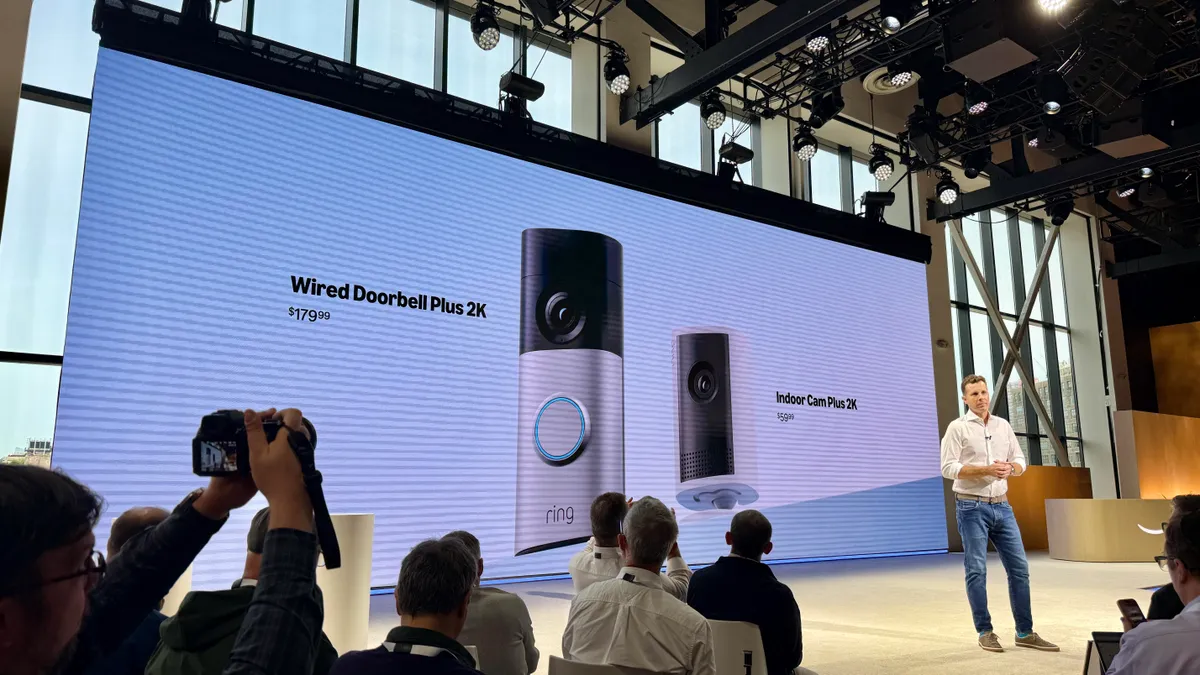Less than two years after eradicating a function that made it simpler for authorities to request pictures from homeowners of Ring doorbells and different safety merchandise, Amazon has partnered with two firms that can assist facilitate the identical kinds of requests.
Two weeks after launching a brand new product line for 2025, Amazon-owned Ring introduced a partnership with Flock SafetyAs a part of its growth of Community Requests function within the Ring Neighbors app. Atlanta-based Flock is a police know-how firm that sells surveillance know-how, together with drones, license plate studying programs and different instruments. The announcement follows a partnership. Ring signed with Axonpreviously Taser International, which additionally makes instruments for regulation enforcement and navy purposes.
Together, the 2 partnerships level to Amazon’s Ring division not solely reintroducing instruments for police to request pictures or movies from Ring clients with out a warrant, but in addition a nearer alignment with firms which have ties to police departments, ICE, the Secret Service and branches of the navy.
Ring described the method for neighborhood requests in one in every of your weblog posts. He stated an company verified with Axon Evidence, owned by Axon, might submit a neighborhood request that features a particular location and time interval of an incident and particulars about what’s being investigated.
The request would seem publicly within the Neighbors feed of individuals in that space, notifying them of the choice to supply pictures of that incident.
“If you ignore the request, the company will not know; your anonymity and movies are protected. The selection is totally yours,” Ring stated within the put up.
According to the publication, the submitted video goes on to Axon Evidence, the place its authenticity is verified.
Community requests are ‘native’, in response to Ring
In an e-mail in response to our questions, a Ring consultant reiterated the Community Requests course of, including that “solely native public security businesses can provoke Community Requests.”
The localized space despatched is restricted to half a sq. mile, and people businesses do not need entry to details about who will obtain a request to share pictures or what number of Ring customers there are in a given space, in response to Ring. The firm says that those that request info ought to comply with neighborhood pointers.
According to Ring’s web site, solely county and native entities, whether or not regulation enforcement, nonprofits or native governments, you may arrange a Verified Neighbors account. While federal businesses or native branches of federal businesses could be Axon or Flock clients, they might not be eligible for a Neighbors Verified account and wouldn’t be eligible to submit a Community Request, even when a 3rd get together did so on their behalf like Axon or Flock, the Ring consultant confirmed to CNET.
Partnerships would give these businesses extra entry factors to create these requests. Amazon hinted in one in every of its weblog posts that it would add partnerships with different firms. Community requests can solely come from businesses which were verified by a 3rd get together, corresponding to Flock or Axon, and in addition by Ring.
In 2018, when Flock Safety was a fledgling startup, it put in its personal cameras in neighborhoods to supply surveillance and fight crime.
Surveillance passers-by
While pictures from Ring gadgets are solely given to native organizations with the permission of the photographs’ proprietor, that does not imply that different individuals (like somebody strolling their canine or kids enjoying in a neighborhood) are free from potential privateness points if they’re captured on digital camera.
“This settlement creates an advanced downside from a client privateness standpoint as a result of individuals who by no means signed up for surveillance may very well be surveilled, and so they by no means agreed to that,” he stated. Erik Avakiantechnical advisor to Info-Tech Research Group and former chief info safety officer for the Commonwealth of Pennsylvania.
Avakian stated making the provision of Ring footage optionally available nonetheless would not deal with the query of what occurs to the footage as soon as it is within the fingers of authorities or different teams.
“It may very well be used for different analysis, shared with others or maybe even used to seize biometric knowledge and private info corresponding to facial recognition capabilities,” he stated. “The movies might additionally find yourself revealing extra about neighbors, guests or passersby than concerning the incident itself.”
He stated one answer could be to erase any identifiable people or artifacts from the photographs if they don’t seem to be a part of the investigation. Regardless of whether or not that is attainable or not, Avakian stated firms like Ring and people requesting pictures have to be clear about how the movies or pictures will likely be used, how lengthy the information will likely be saved, and whether or not it will likely be shared with anybody else.
Mesh surveillance
What Ring and native authorities are doing with neighborhood requests can create some efficiencies for businesses which can be stretched skinny and haven’t got the sources to collect as a lot proof as doorbell and safety digital camera homeowners can present.
“Crime is not slowing down, however police sources are tighter than ever,” stated Ryan Schonfeld, co-founder and CEO of BeehiveWatchwhich makes use of synthetic intelligence know-how to create safety ecosystems.
“Integrating the know-how provides a single officer entry to crucial knowledge that was beforehand unavailable, performing work that may have required a complete group,” Schonfeld stated. “If we would like crimes to be solved and public security to be maintained, we should embrace the interoperability that makes it attainable with the sources we even have.”
